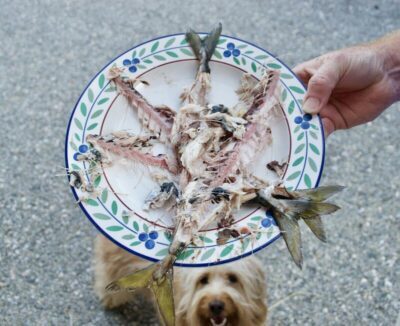When feeding your dog fish, it’s essential to consider the potential risks and benefits. While fish can be a healthy and tasty treat for dogs, it’s necessary to be aware that feeding your dog fish bones can pose certain risks. however, can dogs eat Fish Bones will be thoroughly examine in this article.
Feeding your dogs fish bones are not recommended. Fish bones can be a choking hazard and cause blockages or tears in your dog’s digestive tract. Fish bones can also splinter and cause cuts or tears in your dog’s mouth, throat, or intestines.
If you feed your dog fish, it’s essential to remove all bones before giving them to your pet. Cooked, deboned fish can be a healthy and tasty treat for your dog, but it should not be a regular part of their diet. Fish should only be fed to your dog in moderation as part of a balanced diet.
If you have any concerns about your dog’s diet or feeding habits, it’s always a good idea to consult a veterinarian. They can advise you on the best foods to include in your dog’s diet and help you create a feeding plan that meets your dog’s needs.
Can Dogs Eat Fish Bones?
It is safer to avoid giving fish bones to dogs altogether. Fish bones can be sharp and brittle and break or splinter easily when chewed. If a dog swallows a splintered fish bone, it can cause injury or blockage in the digestive tract, leading to serious health problems.
Additionally, some types of fish contain toxins that can harm dogs. For example, raw salmon can have a parasite called Neorickettsia helminthoeca, which can cause a disease called salmon poisoning in dogs. Symptoms of salmon poisoning include vomiting, diarrhea, loss of appetite, and fever.
However, if you want to give your dog some fish, it is best to cook it thoroughly and remove all bones before feeding it to your dog. This will help ensure that your dog can safely digest the fish and not risk injury from swallowing bones.
It is always a good idea to consult a veterinarian or a professional trainer before introducing new foods to your dog’s diet. They will be able to provide you with specific recommendations based on your dog’s size, breed, and any underlying health conditions they may have.
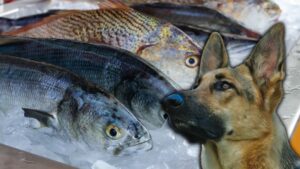
Do you have to debone fish for dogs?
It is generally recommended to debone fish before feeding it to your dog to prevent choking and blockages or tears in your dog’s digestive tract. Fish bones can also splinter and cause cuts or tears in your dog’s mouth, throat, or intestines.
If you choose to feed your dog fish, it’s essential to remove all bones and cut the fish into small, bite-sized pieces to make it easier for your dog to eat. Cooked fish can be a healthy and tasty treat for your dog, but it should not be a regular part of their diet. Fish should only be fed to your dog in moderation as part of a balanced diet.
If you have any concerns about your dog’s diet or feeding habits, it’s always a good idea to consult a veterinarian. They can advise you on the best foods to include in your dog’s diet and help you create a feeding plan that meets your dog’s needs.
Can dogs eat whole raw fish with bones?
Do not feed your dog whole raw fish with bones due to the risk of choking and the possibility of blockages or tears in your dog’s digestive tract. Fish bones can also splinter and cause cuts or tears in your dog’s mouth, throat, or intestines.
In addition, some types of fish can contain parasites or toxins that can harm dogs. It is generally safer to feed dogs cooked fish or fish that has been specially prepared for pets.
If you choose to feed your dog raw fish, it is vital to remove the bones and other potentially harmful parts, such as the head and fins, before serving them to your dog. You must consult your veterinarian before changing your dog’s diet.
Can dogs eat fish skin and bones?
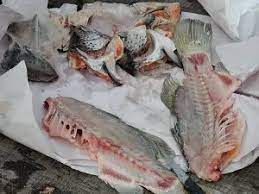
Fish skin and bones are not recommended for dogs because fish skin can be challenging to digest and may cause gastrointestinal upset. Additionally, small bones in fish can splinter and cause injury to a dog’s digestive system.
Though some dogs may tolerate small amounts of cooked, boneless fish as an occasional treat, it is essential to consult with a veterinarian or a professional dog trainer before adding any new food to your dog’s diet.
If you decide to feed your dog fish, it is crucial to ensure that the fish is cooked and deboned to minimize the risk of injury or illness.
How do you cook fish bones for dogs?
If you decide to feed your dog fish and want to include the bones, it is essential to follow some guidelines to minimize the risk of injury. Here is a step-by-step guide for cooking fish bones for dogs:
1. Choose a type of fish that is appropriate for your dog. Some types of fish, such as salmon, are high in mercury and should be avoided. Smaller, softer bones, such as those found in whitefish or tilapia, are less likely to cause problems.
2. Remove any skin, scales, and visible fat from the fish before cooking.
3. Preheat your oven to 350°F (175°C).
4. Place the fish bones on a baking sheet lined with parchment paper.
5. Bake the bones for 15-20 minutes or until they are dry and brittle.
6. Let the bones cool completely before giving them to your dog.
7. Break the bones into small pieces, removing any large amounts that could be a choking hazard.
Finally, monitoring your dog while eating the fish bones is essential to ensure they do not try to swallow any large pieces or choke. If you notice any problems, such as coughing or difficulty swallowing, immediately remove the bones and seek veterinary care.
It is best to avoid feeding fish bones to your dog to prevent any potential health issues. If you want to give your dog a fish-based meal, it is safer to use cooked, deboned fish or commercial dog food that contains fish.
Can dogs eat raw fish?
It is safer for dogs to eat raw fish as long as it is fresh and properly handled. However, it is crucial to be aware that raw fish can contain parasites that can harm both dogs and humans, so it is essential to properly handle and prepare raw fish before feeding it to your dog.
If you are desiring feeding your dog raw fish, it is a good idea to consult with your veterinarian first to ensure that it is appropriate for your dog’s specific needs and health condition.
In a nutshell, it is essential to remember that raw fish should not make up a significant portion of your dog’s diet. Dogs require a balanced diet that includes a variety of nutrients, and raw fish alone may not provide all of the nutrients that your dog needs.
It is essential to feed your dog a complete and balanced commercial diet or to work with a veterinarian or a certified pet nutritionist to create a balanced homemade diet.
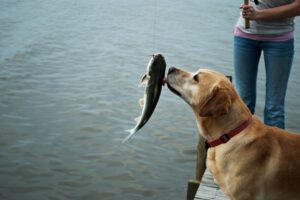
Can dogs eat raw fish sushi?
Occasionally feeding your dogs raw fish, including sushi, is safe but only to be provided sometimes as it isn’t recommended. Raw fish can contain bacteria and parasites that can cause illness in dogs and be difficult for dogs to digest. In addition, some types of sushi include ingredients such as wasabi and pickled ginger that can be harmful to dogs.
If you want to give your dog a safe and nutritious treat, it is best to stick to foods specifically formulated for dogs. Many high-quality commercial dog treats and fares are available that are healthy and delicious. It is always essential to consult with a veterinarian before making any changes to your dog’s diet.
What should you do if your dog eats raw fish?
If your dog has ingested raw fish, monitoring your pet for any signs of illness or distress is essential. Some symptoms include vomiting, diarrhea, loss of appetite, lethargy, and abdominal pain.
If your dog is experiencing any of these symptoms or if you are concerned about your dog’s health after they have eaten raw fish, it’s essential to contact your veterinarian or the ASPCA’s Animal Poison Control Center immediately. They will be able to advise you on the best course of action and provide medical treatment if necessary.
In the meantime, you can prevent your dog from ingesting any more raw fish by keeping it out of reach and securely storing it in the refrigerator or freezer. It’s also a good idea to keep your dog away from areas where they may be able to find and eat raw fish on their own, such as ponds or streams.
Remember, feeding your dog raw fish is generally not recommended due to the risk of bacterial contamination and the possibility of blockages or tears in the digestive tract. If you choose to feed your dog fish, it is crucial to debone it and cook it thoroughly to reduce the risk of illness.
Is it safe for dogs to eat salmon skin?
Salmon skin can be a healthy and tasty treat for dogs, but it should be fed in moderation as part of a balanced diet. It’s important to remember that while salmon skin can be a good source of omega-3 fatty acids, it is also high in fat and calories.
When feeding salmon skin to your dog, it’s essential to remove any bones and cut the skin into small, bite-sized pieces to prevent the risk of choking. It’s also a good idea to cook the salmon skin before giving it to your dog to reduce the risk of bacterial contamination.
Be mindful of your dog’s diet, and consult a veterinarian if you have any concerns about your dog’s nutrition. They can help you create a feeding plan that meets your dog’s needs and advise you on the best foods to include in your dog’s diet.
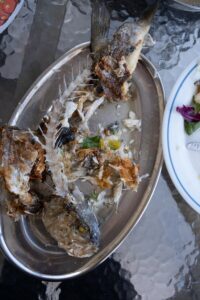
Can dogs eat fish skin with scales?
It is safe for dogs to eat fish skin with scales as long as it is adequately cooked and contains no bones. However, some dogs may have a sensitivity or allergy to fish, so it is always a good idea to introduce any new food to your dog gradually and in small amounts and to watch for any signs of digestive upset or allergic reactions.
Fish can be a healthy part of a dog’s diet. It should be one of many sources of protein. Dogs also need a balanced diet that includes other sources of protein, such as meat and eggs, as well as appropriate amounts of carbohydrates, fats, and other nutrients.
Suppose you are considering feeding your dog fish skin with scales. In that case, it is a good idea to start with a small quantity and watch out for any adverse effects or consult a professional dog nutritionist for guidance on the appropriate amount and frequency to feed it.
What fish can dogs not eat?
A few types of fish are unsafe for dogs to eat, either because they are toxic or because they may contain harmful contaminants. Some examples of fish that dogs should not eat include:
Raw fish
Raw fish can contain harmful bacteria, such as Salmonella and Listeria, which can cause dog illness. It can also have parasites, such as tapeworms, which can be transmitted to dogs through raw fish.
Fish with high levels of mercury
Some types of fish, such as sharks, swordfish, and king mackerel, contain high levels of mercury, which can be toxic to dogs.
Fish from contaminated water sources
Fish caught in contaminated water sources, such as rivers or streams polluted with chemicals or industrial waste, may contain toxins that can harm dogs.
Be mindful of the types of fish you feed your dog, and choose species that are low in mercury and free from contaminants. If you have any concerns about your dog’s diet or feeding habits, it’s always a good idea to consult a veterinarian.
Can dogs eat fish heads?

Feeding your dog fish healthy is not a noble thing to do due to the risk of choking and the possibility of blockages or tears in your dog’s digestive tract. Fish bones can also splinter and cause cuts or tears in your dog’s mouth, throat, or intestines.
If you choose to feed your dog fish, it is best to debone the fish and remove the head before giving it to your pet. Cooked fish can be a healthy and tasty treat for your dog, but it should not be a regular part of their diet. Fish should only be fed to your dog in moderation as part of a balanced diet.
If you have any concerns about your dog’s diet or feeding habits, it’s always a good idea to consult a veterinarian. They can advise you on the best foods to include in your dog’s diet and help you create a feeding plan that meets your dog’s needs.

Can cooked bones be digested by dogs?
Cooked bones can splinter and cause blockages or tears in a dog’s digestive system, leading to severe and potentially life-threatening consequences. It is generally not recommended to give cooked bones to dogs.
Raw bones, however, can be a healthy and safe treat for dogs in appropriate sizes and quantities. Raw bones can provide dental benefits, help keep teeth clean, and provide a source of nutrients, and they can be more digestible than cooked bones.
However, it is essential to supervise your dog when giving them any bone and to choose bones that are appropriate for their size and chewing ability. It is also a good idea to speak with your veterinarian about the best treats for your dog.
Can fish bones kill a dog?
Fish bones can cause problems for dogs if they are ingested. While it is unlikely that a single fish bone would be lethal to a dog, it is possible that it could cause an intestinal blockage or perforation, which can be severe and potentially life-threatening.
If you suspect your dog has ingested a fish bone, it is essential to seek veterinary care as soon as possible. The vet may be able to remove the bone through endoscopy or surgery or may recommend monitoring your dog for any signs of illness.
In the meantime, you can prevent your dog from swallowing any more bones by keeping them out of reach and supervising your dog when it is eating.
Conclusion
In conclusion, feeding your dog fish bones is not recommended due to the risk of choking and the possibility of blockages or tears in the digestive tract. Fish bones can also splinter and cause cuts or tears in your dog’s mouth, throat, or intestines.
However, if you belong to responsible pet owners that want to explore the quest “Can dogs eat fish bones,” then you ensure to debone the fish and cut it into small, bite-sized pieces to make it easier for your dog to eat.
Cooked fish can be a healthy and tasty treat for your dog, but it should not be a regular part of their diet. Fish should only be fed to your dog in moderation as part of a balanced diet.
If you have any concerns about your dog’s diet or feeding habits, it is essential to consult a nearby veterinarian.

